Narcissists Common Traits and How to Spot Them
Curious about how to identify a narcissist in your life? Deciphering the traits of narcissism can feel like navigating a complex maze, especially when the line between confidence and narcissism seems blurred. Recognizing these traits is not just about labeling; it's about empowering yourself to manage interactions more effectively. Well, we'll be going over: Let's […]
Curious about how to identify a narcissist in your life?
Deciphering the traits of narcissism can feel like navigating a complex maze, especially when the line between confidence and narcissism seems blurred. Recognizing these traits is not just about labeling; it's about empowering yourself to manage interactions more effectively.
Well, we'll be going over:
- What are the hallmark traits of a narcissist that set them apart from merely confident individuals?
- How does the need for admiration and lack of empathy manifest in their behaviors?
- What are the implications of their exploitative tendencies on your interactions with them?
Let's dive in.
Recognizing Narcissistic Traits
In navigating relationships with narcissists, recognizing their traits is crucial. Narcissists often exhibit a grandiose sense of self-importance. They might talk about achievements and talents like they're unparalleled, expecting to be acknowledged as superior without matching accomplishments.
Another telltale sign is their constant need for admiration and attention. This isn't just about enjoying compliments; it's a relentless pursuit for validation. If you find someone's self-esteem seemingly dependent on external validation, it's a red flag.
Narcissists also struggle with empathy, showing lack of understanding and regard for others' feelings. This isn't always apparent. Some might feign concern, but their actions often reveal a disregard for others' needs and feelings.
Lastly, entitlement and manipulation are key traits. Narcissists believe they deserve special treatment and will manipulate situations and people to position themselves as the victim or hero, often shifting blame to others.
Identifying these traits early can be pivotal in understanding how to interact with or distance yourself from such personalities.
The Illusion of Grandeur
Narcissists often live in an illusion of grandeur, seeing themselves as superior to others, even without concrete achievements to back up their beliefs. You'll notice they fabricate stories that paint them in a heroic light or exaggerate their accomplishments. This distortion serves a dual purpose: it not only inflates their ego but also manipulates how others perceive them.
Their inflated ego is fragile, though. Despite their outward confidence, they're extremely sensitive to criticism. A slight hint of disapproval can provoke a disproportionate response, often seen as anger or a swift retaliation. They demand unwavering loyalty and agreement from those around them, viewing any form of dissent as a personal attack.
Recognizing these patterns is vital. It helps you understand the reality behind the facade and equips you with the knowledge to navigate interactions more astutely.
Excessive Need for Attention and Admiration
In navigating relationships with narcissists, understanding their excessive need for attention and admiration is crucial. Narcissists thrive on the spotlight. This isn't simply a preference; it's a relentless pursuit. They often orchestrate scenarios to ensure they're the center of attention, whether through grand gestures or dominating conversations. This behavior stems from their deep-seated insecurity and a fragile self-esteem that's heavily reliant on external validation.
You'll notice that narcissists are not just content with being noticed—they crave admiration to an extreme. This manifests in constant fishing for compliments, an insatiable desire for accolades, regardless of the authenticity behind them. Their social media profiles might be a testament to this trait, meticulously curated to project an idealized image that draws attention and praise.
Narcissists' conversations often lack reciprocity. They show little genuine interest in others' lives unless it serves to bring the focus back to them. This attention-seeking behavior isn't merely annoying; it's a calculated strategy to feed their ego and maintain their sense of superiority. Recognizing this trait is pivotal in understanding the dynamics of your relationship with a narcissist and devising ways to navigate it effectively.
Lack of Empathy
When you're dealing with a narcissist, one of the most striking and challenging traits you'll encounter is their Lack of Empathy. Unlike others who might naturally consider your feelings or the impact of their actions on those around them, narcissists struggle with this aspect of emotional intelligence. This doesn't just mean they're occasionally indifferent; it's a consistent gap in their ability to understand or share the feelings of others.
Understanding this can be crucial because it directly affects how they interact with you and others. For example, in situations where empathy is expected – such as comforting someone during tough times – a narcissist may either withdraw entirely or offer responses that seem cold or superficial. It's not that they choose not to care; rather, their brains are wired in a way that makes recognizing and responding to the emotional states of others challenging.
This lack of empathy also feeds into their manipulative behaviors. Since narcissists struggle to genuinely connect with the emotions of others, they often use manipulation as a tool to achieve their ends, with little regard for how it affects you. Recognizing this trait helps you understand certain patterns in your interactions with them and can guide you in setting healthy boundaries or seeking support when needed.
Exploitative Behavior
When dealing with narcissists, you'll often find they exhibit Exploitative Behavior. This means they take advantage of others to achieve their own ends. Without considering the feelings or well-being of the people around them, narcissists see relationships as tools to serve their personal gains. This trait is deeply woven into their interactions, making it a critical point to understand in identifying and dealing with narcissistic individuals.
Narcissists are masters of manipulation, often charming and persuasive to get what they want. Your kindness and generosity might be seen as weaknesses to be exploited. This manipulative behavior is not just about gaining material benefits. It's also about garnering attention, boosting their ego, and maintaining their sense of superiority.
Recognizing these patterns can help you set boundaries and protect yourself from being used. It’s essential to note that exploitative behavior is a clear sign of narcissism, especially when it's a consistent aspect of a person's interactions. Being aware of this can guide you in managing your relationship with them effectively.
Conclusion
Recognizing the traits of narcissists is crucial for navigating relationships with them effectively. Armed with this knowledge, you're better equipped to set healthy boundaries and protect yourself from potential manipulation. Remember, while dealing with narcissists can be challenging, understanding their behavior patterns is the first step toward minimizing their impact on your life. Stay informed, stay vigilant, and prioritize your well-being in all interactions.












